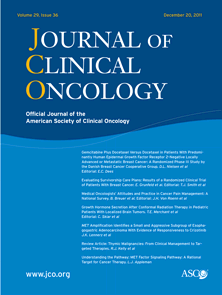JCO:肥胖的大肠癌患者预后较差
2012-01-01 巩睿智 生物谷
梅奥诊所的Frank Sinicrope博士近日在《临床肿瘤学期刊》(Journal of Clinical Oncology)发表论文称,同正常体重者相比,肥胖的大肠癌患者预后较差。 该研究小组通过回顾性研究发现,肥胖的大肠癌患者较不易发生一种预后较好的基因突变--DNA错配修复缺陷(dMMR)。 研究者对2693名II期或III期大肠癌患者进行了研究,发现共有16%的患者有dMMR;女
 梅奥诊所的Frank Sinicrope博士近日在《临床肿瘤学期刊》(Journal of Clinical Oncology)发表论文称,同正常体重者相比,肥胖的大肠癌患者预后较差。
梅奥诊所的Frank Sinicrope博士近日在《临床肿瘤学期刊》(Journal of Clinical Oncology)发表论文称,同正常体重者相比,肥胖的大肠癌患者预后较差。
该研究小组通过回顾性研究发现,肥胖的大肠癌患者较不易发生一种预后较好的基因突变--DNA错配修复缺陷(dMMR)。
研究者对2693名II期或III期大肠癌患者进行了研究,发现共有16%的患者有dMMR;女性较男性更易发生dMMR(其发生率分别为18%和14%);老年女性较年轻女性更易发生(发生率分别为20%和12%)。
作者称,老年女性发生率较高可能与绝经后女性体内雌激素水平降低有关,已有研究证实雌激素可延缓dMMR肿瘤的进展。
研究者还发现,肥胖者发生dMMR的概率低于正常体重者(发生率分别为10.3%和17.4%)。且在多变量分析中,该结论仍成立,校正因素包括与 dMMR相关的肿瘤位置,分期,年龄,性别。此外,肥胖的男性患者dMMR发生率低于女性肥胖患者和正常体重者。且肥胖患者的5年复发率和总复发率显着高于正常体重者,其复发时间和无瘤存活时间均较正常体重者短。(生物谷bioon.com)
10.1200/JCO.2011.39.2563
Frank A. Sinicrope, Nathan R. Foster, Harry H. Yoon, Thomas C. Smyrk,George P. Kim, Carmen J. Allegra, Greg Yothers, Daniel A. Nikcevich andDaniel J. Sargent.
Purpose Although the importance of obesity in colon cancer risk and outcome is recognized, the association of body mass index (BMI) with DNA mismatch repair (MMR) status is unknown.
Patients and Methods BMI (kg/m2) was determined in patients with TNM stage II or III colon carcinomas (n = 2,693) who participated in randomized trials of adjuvant chemotherapy. The association of BMI with MMR status and survival was analyzed by logistic regression and Cox models, respectively.
Results Overall, 427 (16%) tumors showed deficient MMR (dMMR), and 630 patients (23%) were obese (BMI ≥ 30 kg/m2). Obesity was significantly associated with younger age (P = .021), distal tumor site (P = .012), and a lower rate of dMMR tumors (10% v 17%; P < .001) compared with normal weight. Obesity remained associated with lower rates of dMMR (odds ratio, 0.57; 95% CI, 0.41 to 0.79; P < .001) after adjusting for tumor site, stage, sex, and age. Among obese patients, rates of dMMR were lower in men compared with women (8% v 13%; P = .041). Obesity was associated with higher recurrence rates (P = .0034) and independently predicted worse disease-free survival (DFS; hazard ratio [HR], 1.37; 95% CI, 1.14 to 1.64; P = .0010) and overall survival (OS), whereas dMMR predicted better DFS (HR, 0.59; 95% CI, 0.47 to 0.74; P < .001) and OS. The favorable prognosis of dMMR was maintained in obese patients.
Conclusion Colon cancers from obese patients are less likely to show dMMR, suggesting obesity-related differences in the pathogenesis of colon cancer. Although obesity was independently associated with adverse outcome, the favorable prognostic impact of dMMR was maintained among obese patients.
本网站所有内容来源注明为“梅斯医学”或“MedSci原创”的文字、图片和音视频资料,版权均属于梅斯医学所有。非经授权,任何媒体、网站或个人不得转载,授权转载时须注明来源为“梅斯医学”。其它来源的文章系转载文章,或“梅斯号”自媒体发布的文章,仅系出于传递更多信息之目的,本站仅负责审核内容合规,其内容不代表本站立场,本站不负责内容的准确性和版权。如果存在侵权、或不希望被转载的媒体或个人可与我们联系,我们将立即进行删除处理。
在此留言









#JCO#
94
#患者预后#
58